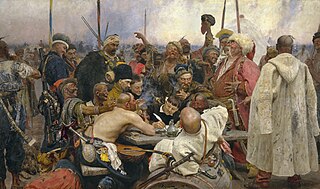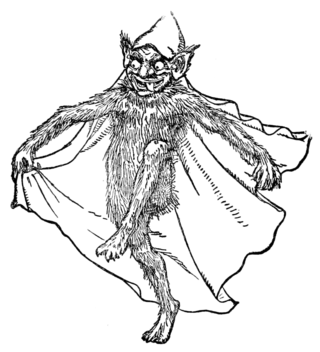Related Research Articles
In grammar, the accusative case of a noun is the grammatical case used to receive the direct object of a transitive verb.

German is a West Germanic language in the Indo-European language family, mainly spoken in Western and Central Europe. It is the most widely spoken and official or co-official language in Germany, Austria, Switzerland, Liechtenstein, and the Italian province of South Tyrol. It is also an official language of Luxembourg and Belgium, as well as a recognized national language in Namibia. There further exist notable German-speaking communities in France (Alsace), the Czech Republic, Poland, Slovakia, Denmark, Romania and Hungary (Sopron).
A kenning is a figure of speech in the type of circumlocution, a compound that employs figurative language in place of a more concrete single-word noun. Kennings are strongly associated with Old Norse-Icelandic and Old English alliterative verse. They continued to be a feature of Icelandic poetry for centuries, together with the closely related heiti.
Womyn is one of several alternative political spellings of the English word women, used by some feminists. There are other spellings, including womban or womon (singular), and wombyn or wimmin (plural). Some writers who use such alternative spellings, avoiding the suffix "-man" or "-men", see them as an expression of female independence and a repudiation of traditions that define women by reference to a male norm. Recently, the term womxn has been used by intersectional feminists to indicate the same ideas while foregrounding or more explicitly including transgender women, non-binary women, intersex women, queer women, and women of color.
An adjective is a word that describes or defines a noun or noun phrase. Its semantic role is to change information given by the noun.

A senate is a deliberative assembly, often the upper house or chamber of a bicameral legislature. The name comes from the ancient Roman Senate, so-called as an assembly of the senior and therefore considered wiser and more experienced members of the society or ruling class. However the Roman Senate was not the ancestor or predecessor of modern parliamentarism in any sense, because the Roman senate was not a de jure legislative body.
The word cisgender describes a person whose gender identity corresponds to their sex assigned at birth, i.e., someone who is not transgender. The prefix cis- is Latin and means on this side of. The term cisgender was coined in 1994 as an antonym to transgender, and entered into dictionaries starting in 2015 as a result of changes in social discourse about gender. The term has been and continues to be controversial and subject to critique.

Tok Pisin, often referred to by English speakers as New Guinea Pidgin or simply Pidgin, is a creole language spoken throughout Papua New Guinea. It is an official language of Papua New Guinea and the most widely used language in the country. However, in parts of the southern provinces of Western, Gulf, Central, Oro, and Milne Bay, the use of Tok Pisin has a shorter history and is less universal, especially among older people.

A churl, in its earliest Old English (Anglo-Saxon) meaning, was simply "a man" or more particularly a "free man", but the word soon came to mean "a non-servile peasant", still spelled ċeorl(e), and denoting the lowest rank of freemen. According to the Oxford English Dictionary, it later came to mean the opposite of nobility and royalty, "a common person". Says Chadwick:
we find that the distinction between thegn and ceorl is from the time of Aethelstan the broad line of demarcation between the classes of society.
Plautdietsch or Mennonite Low German is a Low Prussian dialect of East Low German with Dutch influence that developed in the 16th and 17th centuries in the Vistula delta area of Royal Prussia. The word Plautdietsch translates to "flat German". In other Low German dialects, the word for Low German is usually realised as Plattdütsch/Plattdüütsch or Plattdüütsk, but the spelling Plautdietsch is used to refer specifically to the Vistula variant of the language.

In German orthography, the letter ß, called Eszett or scharfes S, represents the phoneme in Standard German when following long vowels and diphthongs. The letter-name Eszett combines the names of the letters of ⟨s⟩ and ⟨z⟩ in German. The character's Unicode names in English are sharp s and eszett. The Eszett letter is used only in German, and can be typographically replaced with the double-s digraph ⟨ss⟩, if the ß-character is unavailable. In the 20th century, the ß-character was replaced with ss in the spelling of Swiss Standard German, while remaining Standard German spelling in other varieties of the German language.
Hauptmann is a German word usually translated as captain when it is used as an officer's rank in the German, Austrian, and Swiss armies. While Haupt in contemporary German means 'main', it also has and originally had the meaning of 'head', i.e. Hauptmann literally translates to 'head-man', which is also the etymological root of captain . It equates to the rank of captain in the British and US Armies, and is rated OF-2 in NATO. Currently there is no female form within the German military : the correct form of address is "Frau Hauptmann."

Ataman was a title of Cossack and haidamak leaders of various kinds. In the Russian Empire, the term was the official title of the supreme military commanders of the Cossack armies. The Ukrainian version of the same word is hetman. Otaman in Ukrainian Cossack forces was a position of a lower rank.
A boyfriend is a man who is a friend or acquaintance to the speaker, often specifying a regular male companion with whom a person is platonically, romantically or sexually involved.
Ergi (noun) and argr (adjective) are two Old Norse terms of insult, denoting effeminacy or other unmanly behaviour. Argr is "unmanly" and ergi is "unmanliness"; the terms have cognates in other Germanic languages such as earh, earg, arag, or arug, among others.
Mokilese, also known as Mwoakilloan, Mwokilese, or Mwoakilese, is a Micronesian language originally spoken on Mwoakilloa, Federated States of Micronesia. Of the 1200 Mokilese speakers, only about 500 live on Mwoakilloa.

The word geek is a slang term originally used to describe eccentric or non-mainstream people; in current use, the word typically connotes an expert or enthusiast obsessed with a hobby or intellectual pursuit. In the past, it had a generally pejorative meaning of a "peculiar person, especially one who is perceived to be overly intellectual, unfashionable, boring, or socially awkward". In the 21st century, it was reclaimed and used by many people, especially members of some fandoms, as a positive term.
The word kike is an ethnic slur for a Jew.

A goblin is a small, grotesque, monstrous creature that appears in the folklore of multiple European cultures. First attested in stories from the Middle Ages, they are ascribed conflicting abilities, temperaments, and appearances depending on the story and country of origin, ranging from mischievous household spirits to malicious, bestial thieves. They often have magical abilities similar to a fairy or demon, such as the ability to shapeshift.
Feminist language reform or feminist language planning refers to the effort, often of political and grassroots movements, to change how language is used to gender people, activities and ideas on an individual and societal level. This initiative has been adopted in countries such as Sweden, Switzerland and Australia.
References
- ↑ Bock, Hans-Michael; Bergfelder, Tim, eds. (2009). The Concise Cinegraph: Encyclopaedia of German Cinema. New York: Berghahn Books. p. 74. ISBN 1571816550. JSTOR j.ctt1x76dm6.